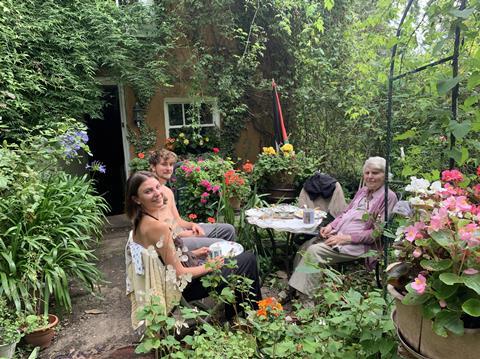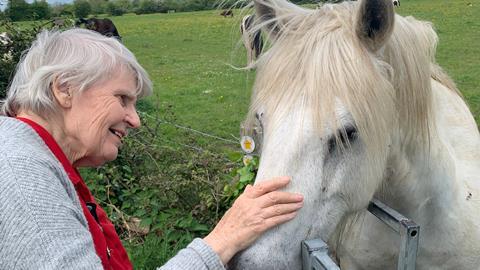Rev Sue Parfitt became a nun straight from university, then trained first as a social worker then a priest. Now aged 83 and a protestor with Christian Climate Action, Sue says Christians should be leading the way in addressing the impending climate catastrophe
I was born into a Christian family in South Wales, and brought up near Newport. My mother was 43 and my dad was 50 when I was born. They’d lost their firstborn, a boy, from appendicitis when he was four, and I came eight years later.
Taking faith seriously
It was a very happy childhood, even though I was an only child and I lived under the shadow of my lost brother. I was baptised at the age of three months during the Second World War. My mother would pray with me every night and read stories. I loved Bible stories and remember a time when I was about eight and Mum must have been telling me something about Jesus and his crucifixion. I said to her: “Well, if Jesus has done all this for me, I must be a missionary, mustn’t I?” I see that as a moment of really realising what it meant to be a Christian.
I went to boarding school aged eleven, paid for by relatives, and then read history at Bristol University. I knew that I was going to be a nun immediately after university. I’d been given this wonderful book called The Story of a Soul; it’s the autobiography of St Thérèse of Lisieux, a young Carmelite French nun. It seemed to me then that the only way to give oneself completely to God was to enter religious life (I’ve changed my mind on this now).
I was ordained as priest in 1994 along with the other first women to become priests
So three weeks after my graduation, I joined a community of nuns – the Community of the Holy Name. It was a wonderful community, very strict, but it was equally devoted to the active life of service and the life of contemplative prayer. After nearly three years, as my parents were very old, I was given permission to go and earn some money for them. They were very poor and my father had had a major stroke. It felt sensible for me to leave the community and re-join at a later date. I was 25 when my father died in 1970, and then my mother died in 1977.
Embracing new directions
Instead of going back to the convent, I trained as a social worker and then as a family therapist. There was no training in family therapy in the UK at the time, but it was being established in America so I went to train in New York. Afterwards, I helped to set up the first family therapy clinic in Cardiff. For ten years, we all worked hard at trying to establish this as a new way of helping people and working with families therapeutically.
I wrote the first book on family therapy in the UK, Family Therapy: The treatment of family systems, which was published in 1976.
After I had finished working in the clinic, I worked as a lecturer in family therapy in the social work department in Bristol University. When the contract came the end, I began to think: “Perhaps God wants me more fully back working for the Church.” So in my 40s I trained for the ministry at Ripon College, Cuddesdon.
This was the early 1980s when women couldn’t be priests. There were just five women at Cuddesdon in that year and we were battling about inclusive language in the liturgy. After training I worked first as a deaconess, and then became much involved in the movement for the ordination of women. After the vote went through in 1992, I was ordained as a priest in 1994 along with the other first women to become priests, which was very wonderful.
I had no parish experience when I came out of college so my boss sent me to a parish in Bristol for weekends, where there was this bachelor priest called Graeme. It was love at first sight and, ten months later, we were married!
We were married only for 28 years because of marrying late. He died young, really, at 77 and I found that very hard to cope with. I was greatly helped by a friend, Phil; once a week I would go and visit him and sit and cry. Gradually the grief became manageable.
When I first became a widow, I again felt that the only way for me to give myself wholly to God would be in the religious life, so I decided to try to return to being a nun. I went to a community in Oxford, and the mother superior nearly fell off a chair when I said: “Would you accept me as a postulant? I’m 71.” She then said: “Alright. Come and give it a try.” I was there for ten months. It was a very lovely time, and I was sad to leave. But I think both they and I, felt I should be in the world. In retrospect, I now understand why.
Peaceful protest
The climate protest movement really took off in 2019 with Christian Climate Action, Extinction Rebellion and, later, with Insulate Britain and Just Stop Oil. I came to realise that God was presenting me with both the gift and the challenge, in my old age, of becoming fully part of the effort to at least try to slow down the climate catastrophe which was threatening all life on earth with the worst existential threat ever known to humankind. I feel deeply called to do what I am doing now.
Protests for the climate emergency have become the vehicle of my obedience to God, not in any way an impediment to it, as some Christians seem to think! What more wonderful experience than to lay down one’s life, albeit momentarily, on the road for God and to hand over oneself in complete dependence on God at the point of arrest by the police?
I have been arrested about 28 times. I was one of those who sat on the road as part of the Insulate Britain campaign in November 2022. It brought the M25 to a standstill during a series of protests leading up to COP26, the UN Climate Change Conference, in Glasgow. National Highways were instructed to bring a civil case against us, and we were taken to the civil courts and given enormous fines. Then we were charged with public nuisance in the criminal courts. I’m still going through the criminal courts for these actions, but being a Christian means that we sign up for persecution and walking the way of the cross, doesn’t it? Not tea parties or being popular or being on the right side of the law when the law is protecting the fossil fuel industry and therefore enabling the destruction of God’s beautiful creation.
We are called to follow Jesus, whatever the cost. And Jesus was continually in breach of the law because he was calling out the evils of his day within the civil and religious authorities. He went to the cross directly because of his action in the temple, overturning the tables of the money changers and opposing the corruption and self-serving lifestyle of the rich.
I protest for the Global South, who are so impacted by our terrible burning of fossil fuels. We get all the benefits, and they get all the consequences; and I do it for the next generation who will have no future at all. We’re not powerless. We’re told by the scientists that even to slow the climate emergency down, to stop global warming by a fraction of a degree, will save millions of lives and huge amounts of suffering. That’s worth doing, isn’t it?
I wrote my latest book, Bodies on the Line (Lab/ora Press), about 18 months ago, calling on Christians to take a leading part in the struggle to address the impending climate catastrophe. It’s mainly about doing anything you can to slow down the climate catastrophe and it’s especially about getting involved in civil disobedience, of which there is a long and honourable Christian tradition. Otherwise, the three things people can do straightaway are: stop burning fossil fuels, stop eating meat and stop flying.

Experiencing God’s joy
Prayer is very important to me, and I can live a contemplative life now. I start the day with Christian Climate Action on Zoom from 9–10am. We have a time of prayer and then a time of reflection on the Bible readings for the day. After that, I say morning prayer, and then I have half an hour’s contemplative prayer. I say evening prayer and have more silent prayer time in the afternoon – when I am not out on an action of course!
I have almost no blood family but I have many wonderful friends
I have almost no blood family but I have many wonderful friends. Of course, you lose many friends by the time you’re 83, but my membership of the climate movement provides me with so many new young friends, and that is the family that God has given me in the most wonderful way. I am devoted to them and they to me, ; I don’t feel the lack of anything really.
Life is about radical obedience to the will of God. That seems to me to be what brings one joy and happiness in all its forms. The Beatitudes are a wonderful basis for life. What makes us blessed is not anything like the world thinks of as bringing happiness. It’s the upside-down values of the kingdom of heaven that progressively bring joy to our lives when they are lived for others not for ourselves. Life gets better and better as one gets older, because God continually calls us into new adventures and new wonderful possibilities for practising our faith. I have so much to thank God for and so much to look forward to, because God never stops calling us into new ways of discipleship, service and love.
Sue’s book Bodies on the Line (Lab/ora Press) is now available on audiobook.
We spoke with Sue for the Woman Alive podcast episode: Christians of all ages should care for the environment
LISTEN NOW on Spotify
LISTEN NOW on Apple Podcasts
This article is part of our Life Lessons series. If you are a Christian woman over 70 and want to share your story, please email us womanalive@premier.org.uk





























No comments yet